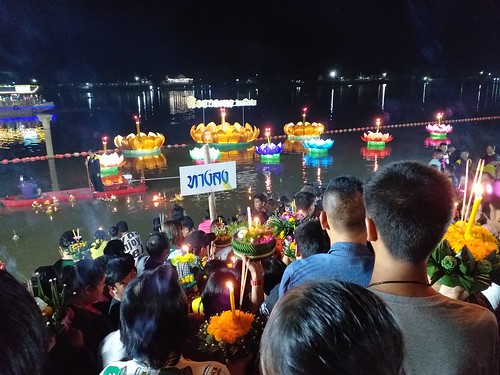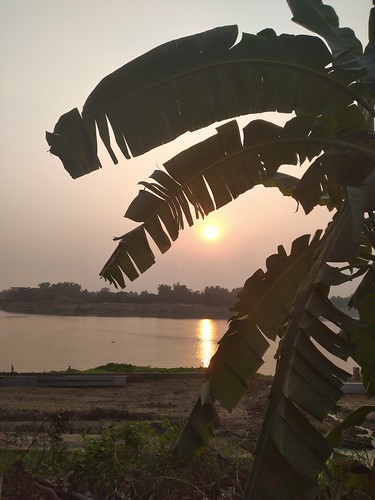Hi! We’re Rich and Kate. Three years ago, we decided to leave our cosy, normal lives back in the UK to go and find something different. That ‘different’ was a new life as teachers in South East Asia. After some time, we decided that we would like to share some of our experiences with anyone who had similar interests to us, and so, the twotravellingteflers adventure was born. We offer a tiny look into our lives of travel, TEFL, and Thailand.

1. What motivated your decision to teach abroad? How/why did you choose where to go?
We had both completed degrees but were struggling to find employment in our respective fields. I (Rich) had a degree in psychology and Kate in criminology. Not being able to find work in these areas it made us re-evaluate what we were doing. Both of us love to travel, and we had both thought about living and working abroad. Teaching was the perfect path to take, we both love education and learning and we both love new experiences and culture, so it seemed right.

2. How did you find your job? What resources did you use?
It took a lot of reading and perusing the internet to even know where to start. Forums were our best friend. There are countless resources to choose from; forums such as expatforums or lonelyplanet can give insight to the journey of living and teaching abroad. Seriously, keep on reading. Learn as much as you can about what to expect. Even though reading can never prepare you for everything, having a well-rounded base will definitely help.
To find employment, we again used a lot of forums or niche websites, like Dave’s ESL Café, TES, or TEFL.org (the learning provider from where we gained our teaching qualification).


3. What was your experience like? Can you share some favorite memories - and challenges?
Some of our most favourite memories were the challenges that were presented to us. The navigation of new cultures, cities, and sights. They were all just so fascinating and awe-inspiring. From never setting foot in South East Asia to being absolutely immersed in its society was both nerve-wracking and breath-taking at the same time. You will always have the highlights from each country; the white-sandy beaches, jungles, and markets of Thailand are beautiful and fascinating, but the immersion of culture is what mind-blowing to us.
Probably the most significant daily challenge is the language barriers. Hot tip—no matter how long you plan to stay in a place, start learning the language immediately. It will really help. To showcase the problems of the language barrier, we were visiting Chiang Mai a while back, and we had found a quaint restaurant next to the River Ping. We were passing the time, chatting and having a few Leos (Thai beer) and decided to order some snacks. They offered chicken tenders. Sounded nice. When they arrived, we bit into them, only to receive a mouthful of cartilage. Turned out, they were chicken tendons, a delicacy here in Thailand. These sorts of experiences happen often, but they are the things you can look back and have a giggle over.

4. What skills did you develop from your experience? Do you feel changed from your teaching experience abroad?
So, we are still living and teaching here, three years long now, but we are still constantly developing. From developing your skills as a teacher to enhancing your skills of communication, living and working abroad is a near-constant learning curve. Doing this also tends to enhance your ability to be flexible, open-minded and understanding. If like us, you grew up in just one centralised society, being able to develop these abilities is paramount. Being closed off to integrating is a non-starter; you would just be wasting your time and making your experience less enjoyable...and much, much harder.
Doing this has given both of us a sense of confidence that is hard to really describe. Knowing that you can completely up-end your world—and go so far out of your comfort zone you might as well be cruising to Mars—gives you a feeling that you can achieve anything if you put a positive mind towards it. The integration into a new culture makes you feel so well-rounded and grown, just because it makes you see the world differently, from a new perspective, destroying all preconceptions you had before embarking on this adventure.

5. Has your experience helped you get to where you are today?
I think for the both of us, the positive traits that are mentioned above are what helps us day-to-day. Whatever skills that we have developed over the previous years from living abroad is applicable to everyday life. The professional skills are indispensable, but the more influential ones—communication, open-mindedness and confidence—are so valuable. These are the skills that you can take anywhere and apply to any endeavour and, therefore, the ones that we feel are most important.
Adding to this are the memories. Above most skills are the memories you make, the friendships you nurture, and the experiences you cherish. Having these memories is a constant reminder that when you put your heart and mind into your future and try to overcome the anxieties of pushing your personal envelope, you can achieve great things.

6. Any advice for teachers thinking about working overseas? What are some highlights or things that you gained or changed your perspective?
Don’t just think about it, do it. You only regret the chances you didn’t take. The whole affair can seem scary and overwhelming. To be honest, it is, but you can do it. Preparation is key. Start networking early, make connections. When working in Thailand, the only way to go to begin with is through an agency. Find the right agency, and the best way to do that is through research. Again, forums are your best friend.
Doing this sort of work, you fortunately meet people from all over the world. They become your multi-ethnic family, and it’s hard to describe how nice that is. You hear and learn about not only the country you are residing in, but other countries from the people you encounter. You gain a personal experience of countries you have never been to just by speaking to your friends. You respect their customs and learn important phrases in their language. You discover beautiful differences and, more importantly, similarities of the lands and people who have slowly become like family in your home away from home.

7. How has international education impacted or influenced your cultural identity?
It has definitely given us the feeling of being more of a global citizen rather than coming from one country. It has made us feel like we are part of a bigger picture and part of a global effort to bring different facets of education to everyone. Although this sounds a little grandiose, it is the feeling that the work is worth it, as you can see the impact your efforts make.
As we are teaching language, when you start to see the improvement from your students, it makes you smile and reinforces that all of the change to your life—the good and the challenging—is worth it.

Find Rich and Kate online at:
https://www.twotravellingteflers.com/
https://twitter.com/twotravellingt1
https://www.instagram.com/twotravellingteflers/
https://www.pinterest.com/twotravellingteflers/
#TeachAbroadBecause ... experience is the best teacher
All photos courtesy and copyright Twotravellingteflers, used with permission
